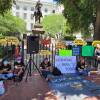The push to let unauthorized immigrants get Massachusetts driver’s licenses took a significant step forward Wednesday when the Massachusetts House emphatically overrode a veto by Gov. Charlie Baker.
On May 27, Baker vetoed a bill allowing the licenses. On Wednesday, 119 state representatives voted in favor of an override and 36 voted against. A two-thirds vote in both the House and Senate is required to override a gubernatorial veto.
The outcome Monday was not unexpected. The House initially passed legislation to expand license eligibility by a similarly wide margin in February , nearly three months before the state Senate followed suit. Still, the chamber burst into loud applause when the final tally was announced just before 2 p.m.
In a statement emailed immediately after, Elizabeth Sweet, the executive director of the Massachusetts Immigrant and Refugee Coalition, praised the House vote, saying the bill — dubbed the Work and Family Mobility Act by supporters — will “both strengthen our economy and strengthen relations between immigrants and law enforcement” if, as expected, it becomes law.
For that to happen, the state Senate will also need to override the veto. It passed the legislation in May with a veto-proof majority.
A spokesperson for Senate President Karen Spilka said the Senate plans to take up Baker’s veto on Thursday.
The pending legislation would allow unauthorized immigrants to obtain drivers' licenses if they can provide proof of their identity, date of birth, and Massachusetts residency, and meet other standard requirements for licensure.
If the bill finally becomes law, it would make Massachusetts the 17th state to take such a step, according to the National Conference of State Legislatures.
As the proposal advanced on Beacon Hill this year, supporters waged a sustained public-relations campaign, including an April event at which several big-city mayors voiced their support.
At that event, Chelsea City Manager Tom Ambrosino made a public-safety argument for the legislation, while noting that 45 percent of Chelsea residents were born outside the United States and that many of them lack legal status.
“I have no doubt it will improve public safety in our community,” Ambrosino said at the time. “Having more of our residents trained and legitimately licensed and insured on the road will absolutely make a difference in safety. And I think that’s why [Chelsea Police Chief Brian Kyes] and the major police chiefs and other public-safety organizations support this effort.”
In a regular press conference with Spilka and House Speaker Ron Mariano earlier this week, Baker reiterated his belief that — because Massachusetts automatically registers applicants for driver’s licenses to vote — the measure could lead to confusion about voting eligibility.
“[By] adding a new process and a new set of eligibles, using documentation that the [Registry of Motor Vehicles] has not seen before ... we are creating an issue for cities and towns around eligibility,” Baker said Monday.
The proposed legislation would require the RMV, working in consultation with the secretary of state, to create procedures that ensure applicants who do not provide proof of lawful residency are not automatically registered to vote.
Produced with assistance from the Public Media Journalists Association Editor Corps funded by the Corporation for Public Broadcasting, a private corporation funded by the American people.







